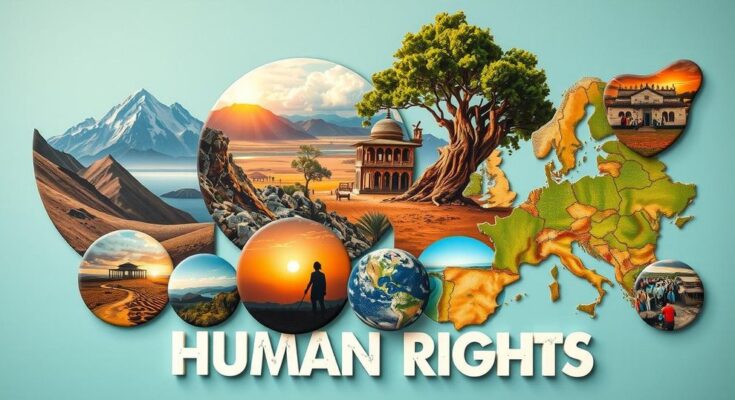The European Parliament has adopted significant resolutions addressing human rights violations in Thailand, Sudan, and Azerbaijan. Key actions include condemning deportations in Thailand, urging humanitarian access in Sudan, and demanding the release of Armenian hostages in Azerbaijan. These resolutions reflect the EU’s commitment to human rights and the need for reforms in these countries.
On Thursday, the European Parliament passed human rights resolutions addressing significant concerns in Thailand, Sudan, and Azerbaijan. The resolutions highlight violations of democratic principles and human rights in these countries, prompting calls for action from the European Union (EU) to address these breaches comprehensively.
In Thailand, the Parliament condemned the deportation of Uyghur refugees and urged the government to cease forced returns to nations where individuals’ lives may be endangered. Additionally, Members of the European Parliament (MEPs) encouraged the Commission to utilize free trade negotiation leverage to prompt legal reforms, including changes to the lese-majesty law and the release of political prisoners.
MEPs appealed for the UN High Commissioner for Refugees (UNHCR) to have unrestricted access to detained Uyghur asylum seekers and called for the amnesty of parliamentarians and activists facing persecution under oppressive laws. They also advocated for the suspension of extradition treaties with China until Uyghurs’ rights are guaranteed.
Regarding Sudan, the Parliament expressed serious concern over the political and humanitarian crises exacerbated by ongoing hostilities. MEPs called for an immediate cessation of violence, adherence to the Jeddah Declaration, and unrestricted humanitarian access for displaced civilians.
The resolution strongly condemned the rise in sexual violence, particularly against children, by both the Sudanese Armed Forces and the Rapid Support Forces. MEPs urged member states to impose sanctions on prominent figures and emphasized the need for increased humanitarian aid and protection for vulnerable populations, including women and children.
In Azerbaijan, the European Parliament denounced the unlawful detention of Armenian hostages based on sham trials and demanded their immediate release. MEPs called for fair trials and medical access for these prisoners, advocating for investigations into allegations of ill-treatment.
The Parliament stressed the importance of reopening the offices of the UN and the International Committee of the Red Cross and requested that the EU monitor these trials closely. They proposed sanctions against Azerbaijani officials implicated in human rights violations and called for a re-evaluation of the EU-Azerbaijan energy memorandum contingent on improvements in human rights practices.
In summary, the European Parliament’s resolutions aim to address significant human rights violations in Thailand, Sudan, and Azerbaijan. Calls for reformation of laws, humanitarian access, and accountability for offenders underscore the EU’s commitment to upholding human rights standards in these regions.
The recent resolutions adopted by the European Parliament demonstrate a robust response to critical human rights violations in Thailand, Sudan, and Azerbaijan. By advocating for legal reforms, humanitarian access, and accountability measures, the Parliament seeks to promote the respect of fundamental rights and alleviate humanitarian crises. Continued vigilance and action from the EU will be crucial in addressing these urgent human rights challenges.
Original Source: www.pubaffairsbruxelles.eu




